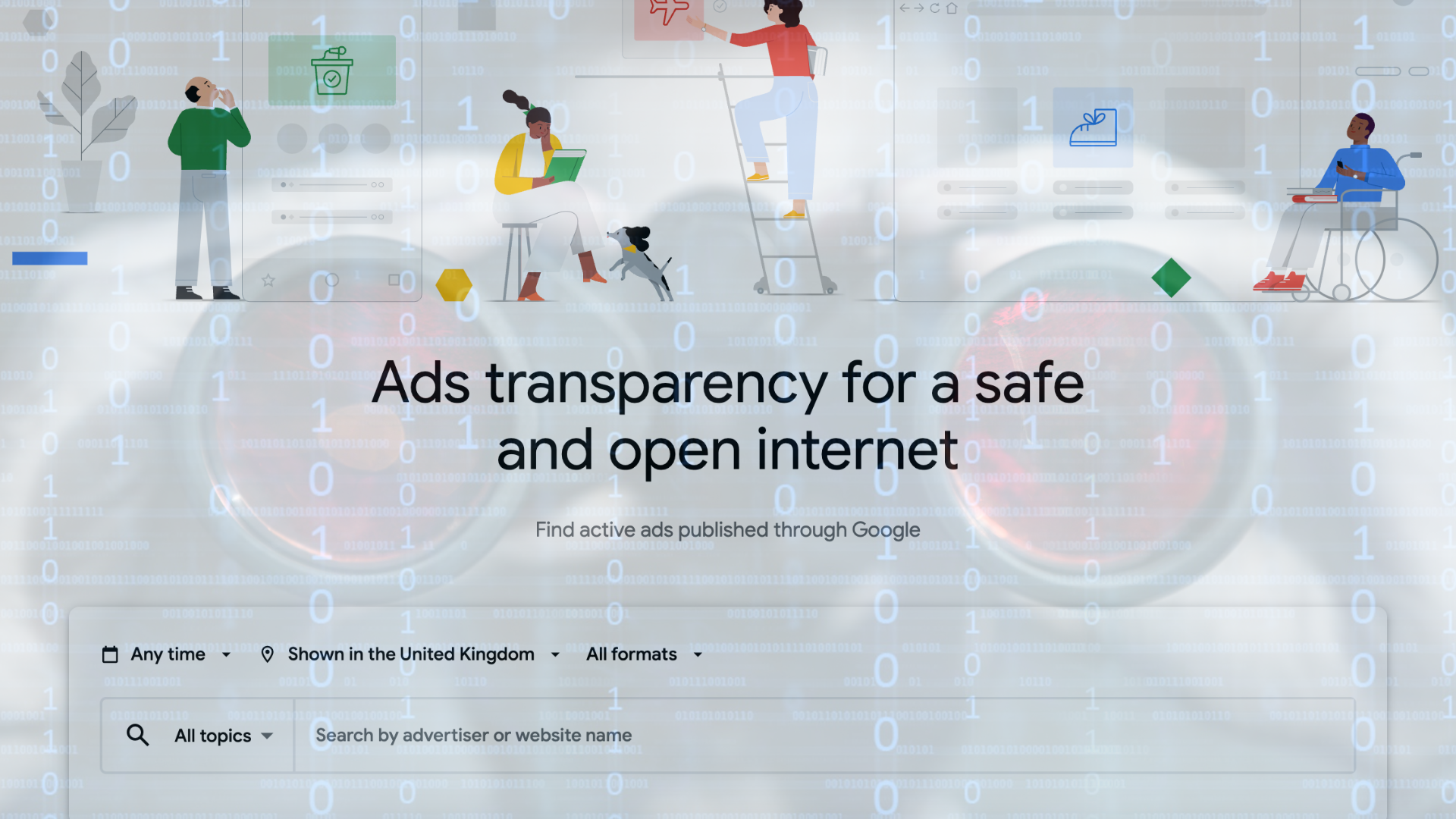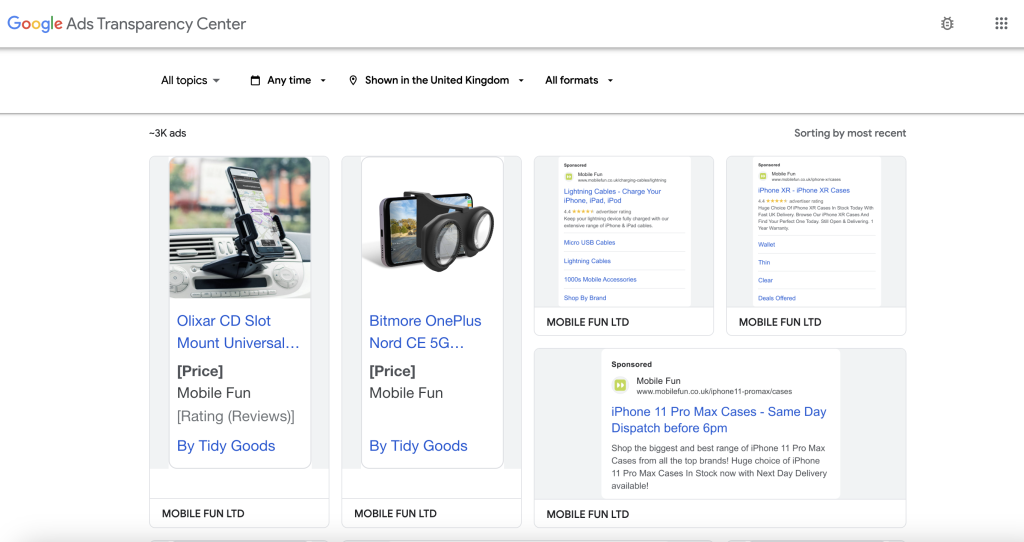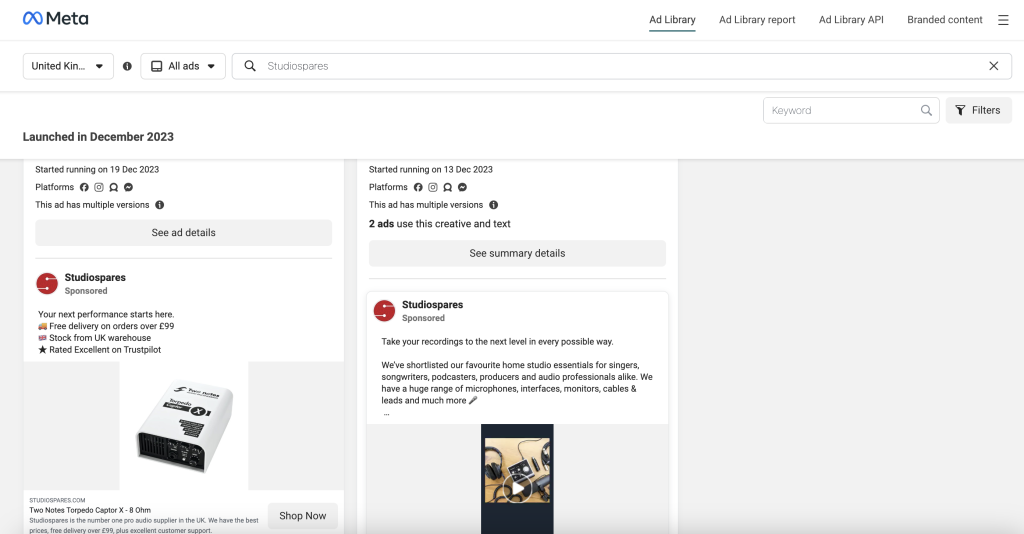
Competitor analysis helps scope industry trends and improve your marketing strategies. One such way is to spy on your competitors’ ads.
Search engines and social media are two of the most visible platforms for businesses, with both offering ways to display paid adverts. With that in mind, both make for excellent places to look at your competitors... but the questions you might be asking are 'how to spy on Facebook ads' 'how to spy on competitor's Google ads?' Well, Google and Meta offer free tools you should be using to look at adverts on their platforms.
There are plenty of tools out there, but there are two in particular to consider:
The Google Ads Transparency Center tool (sometimes known as Google Ads Library) is the perfect tool on how to spy on competitor's Google Ads, including Google’s search engine, YouTube and Gmail.
Simply input the topic or competitor name in the search field and their adverts will appear. The most recent ads in Google Ads Library will appear at the top. This is also a good way on how to spy on competitor's Google Display Ads, helping to check display ads competitors are using.
It’s worth keeping in mind there are some restrictions to what ads are shown. For example, the ad must have been displayed within the last 365 days by a verified business. Some ads may also not appear if they have been taken down due to violating Google ad policies or deleted from the user’s Google Ad account.

Meta Ad Library is a tool that helps you search for adverts across Meta technologies, including Facebook and Instagram. This is a good way on how to check competitor's campaigns from Meta's social media platforms.
Using Meta Ad Library, you can reveal competitor ads on platforms such as Facebook by searching keywords or the advertiser. These can be filtered by ad category topic and location, too. The search results will then display any ad content and basic information, such as when it started running and on what platforms.
There are also a few additional things to keep in mind with the Meta Ad Library. For example, whilst you can view ads displayed without a Facebook or Meta account, it’s best to login in order to view age-restricted ads. The platform also features additional tools like the downloadable Ad Library Report, which displays ads about a chosen topic (or competitor) for a specific time period.

Google and Meta are both committed to providing transparency. They have therefore provided tools to help in the advertising space as part of their pledge. Their tools create an easier way to search for branded content via their online databases.
By showing competitor ads and their information, such as their creator, format, live dates, country of origin and a link to the ad, both Google and Meta aim to empower users to make informed decisions for their own creative outputs.
A key part of competitor analysis is to understand what those in the industry are marketing and how. Both the Google Ads Transparency Center and Meta Ad Library tools help with this. As a result, you can gain valuable competitor insights and market trends to inform your own strategy.
Using these tools, you can find and exploit any gaps or weaknesses to get ahead in your next marketing campaign. For example, you may discover that a competitor is marketing key products or categories that you may either want to avoid or put a new spin on. Similarly, it may help inform the style of campaign you wish to run based on what a competitor provided.
Another reason to use these tools and spy on competitors’ ads is to evaluate audience response. An example of this is in Meta’s Ad Library, which not only shows competitor adverts, but also any comments and reactions. This is particularly useful in gauging consumer sentiment, which is useful if you plan on providing a similar product or type of marketing campaign.
Most of all, both Google Ads Transparency Center and Meta Ad Library offer a free and transparent way to monitor competitor advertising. This means you can see the keywords in titles and meta descriptions used, what imagery has been presented, the format of the ad and any variations, the call to action and plenty more. Any ad shows within 24 hours of going live, giving a timely look at your competitor’s key messaging and promotions.
Armed with these tools and the competitor knowledge they share, how will you respond?
In order to stay competitive, your new eCommerce marketing strategy may lead you to updating your website. In such circumstances, our Birmingham-based team of expert developers are ready to help grow your site. That includes Magento development, Shopify development, Shopify Plus development, retainer support and more.
To discuss what our eCommerce web development agency can do for you, contact us today.



